GET IN TOUCH
- Please wait...
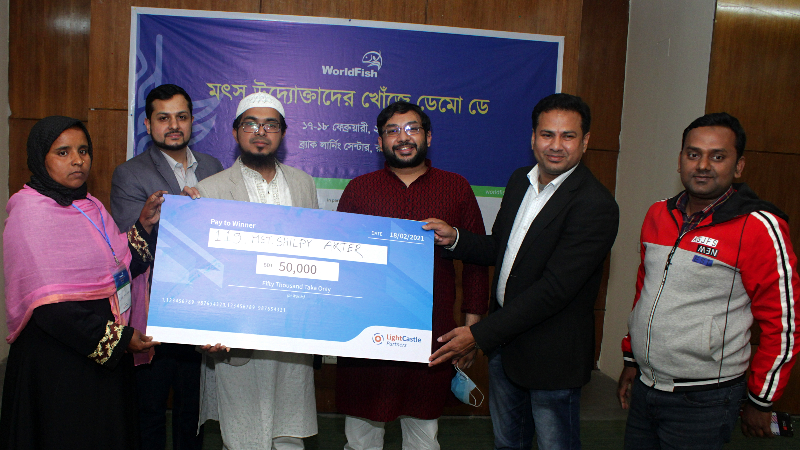
The IDEA (Income, Diets, and Empowerment through Aquaculture) project, which is implemented by WorldFish in Bangladesh and funded by The Bill and Melinda Gates Foundation, aims at addressing the hurdles in the aquaculture sector of Bangladesh that are limiting it to reach its full potential in this sector by capacity development, research, and project implementation. Under the IDEA project by WorldFish, LightCastle Partners was commissioned with the SMARTCAP Project – Business Scale-Up Program for Aquaculture Ecosystem; a Business Incubation program aimed to develop the beneficiaries through capacity development, market linkages, and access to finance.
SMARTCAP business incubator combines 3 critical components that are designed in conjunction to help propel the growth trajectory of aquaculture entrepreneurs in Bangladesh. The project will transform the enterprises into growth-oriented ventures by providing capacity development, forward market linkage, and access to formal financial products.
Smart Capital addresses the objectives in the following specific ways:
The project aims to support the development of at least 100 new, successful, and financially viable entrepreneurs within the aquaculture value chain. With LightCastle Partner’s support of its flagship business incubator – Smart Capital – alternative investments and capacity development support, the aquaculture entrepreneurs will have better chances to grow and propel the market forward. Besides, the target of this project was to reach a total of 100 entrepreneurs from the Rajshahi and Rangpur regions and provide them with business development support. However, we could incorporate 75 financially viable aquaculture enterprises into this accelerator program.
The program was designed to engage with potential aquaculture SMEs across five stages:
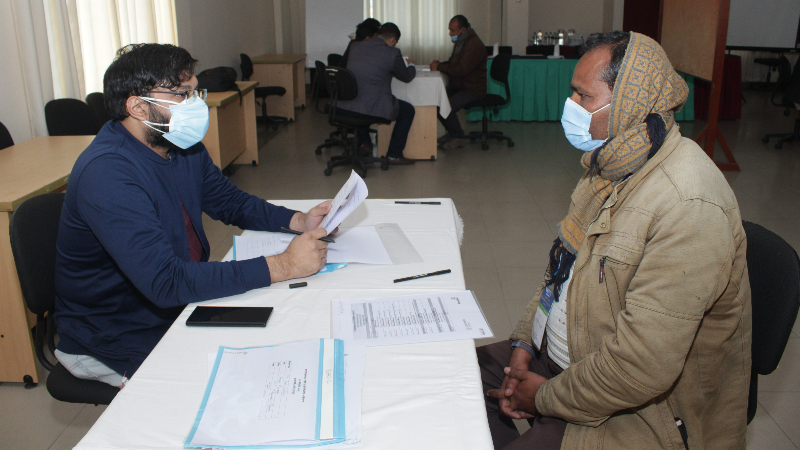
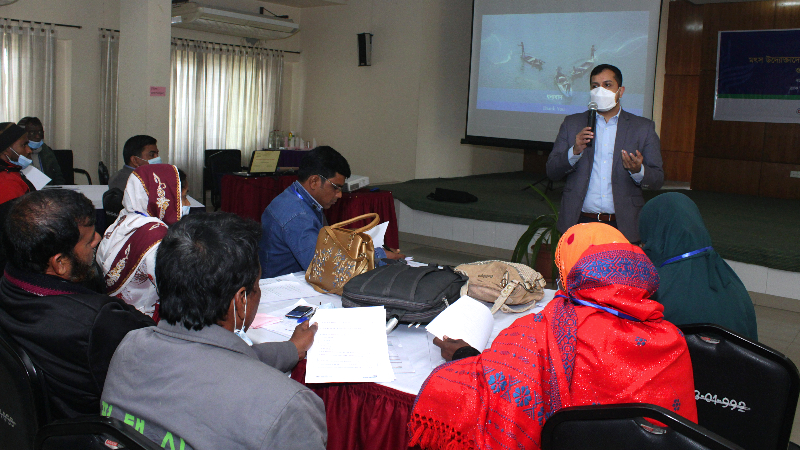
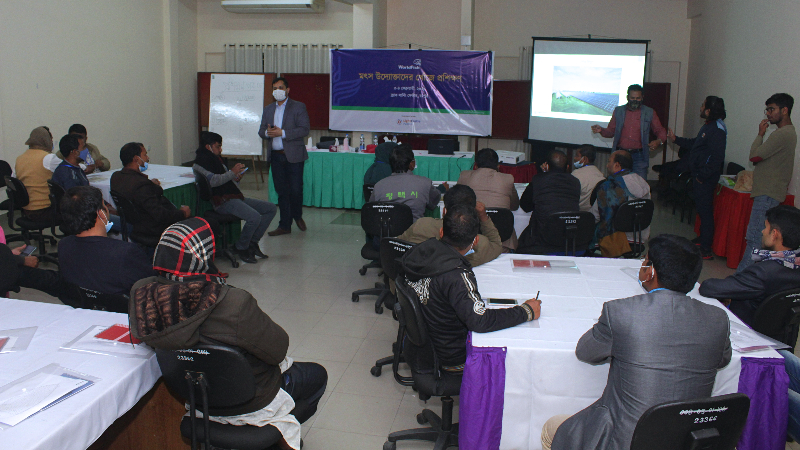
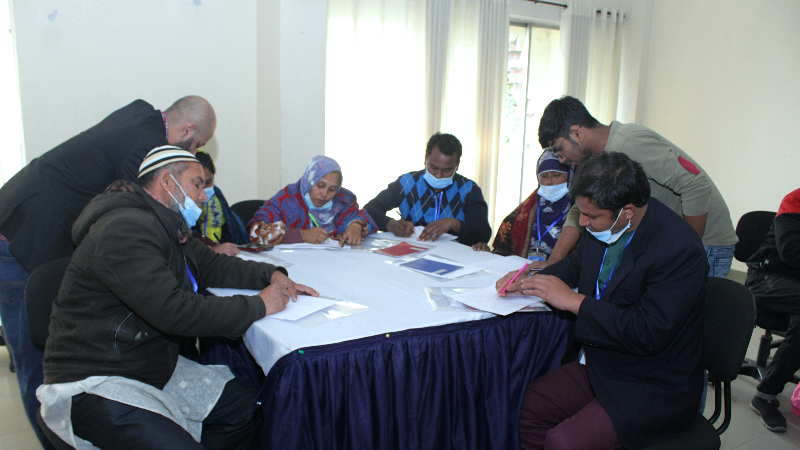
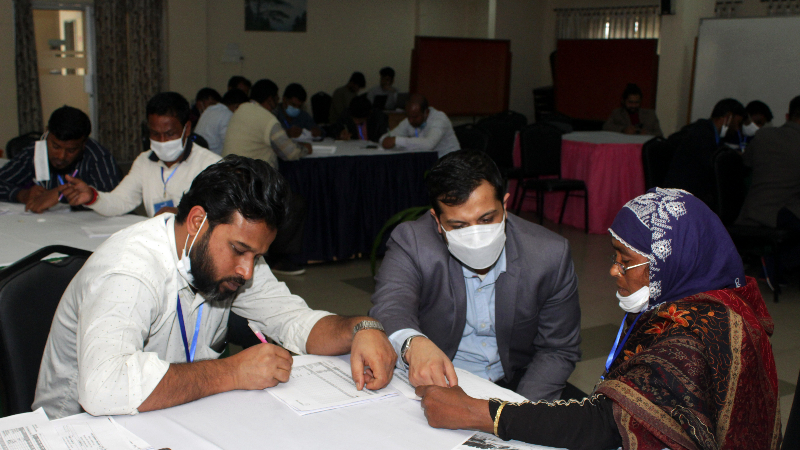
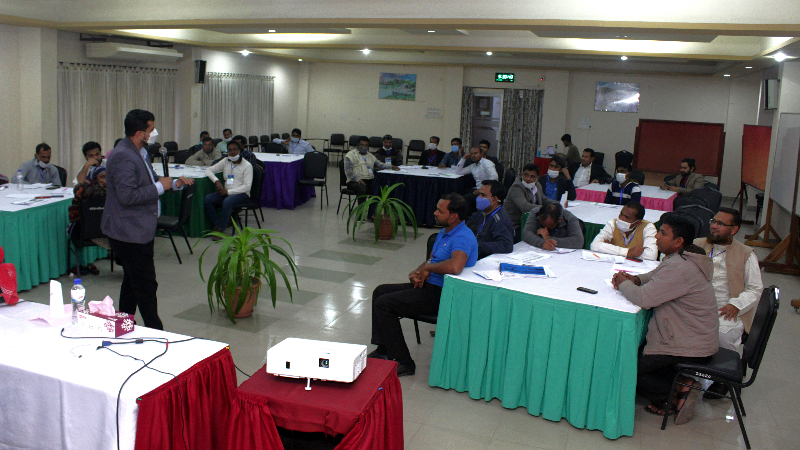
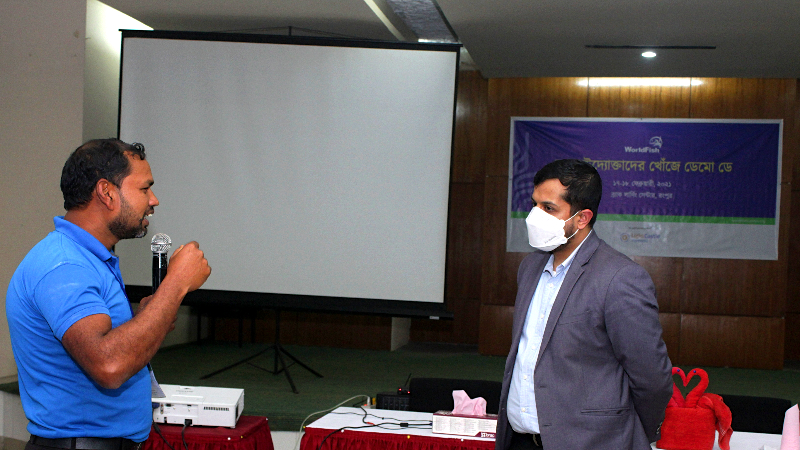

SME owner winning the price of investment
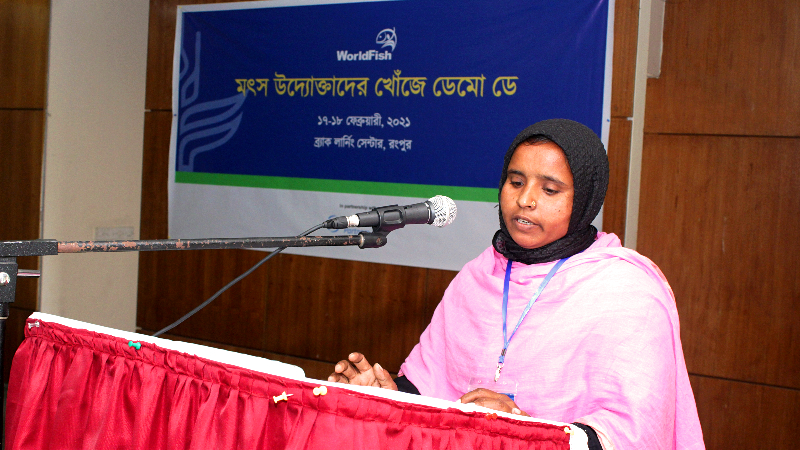
SME owners pitching their businesses in front of an esteemed panel of judges
The 1st Batch of the “Aquaculture Entrepreneurship Scale-Up Program” was concluded in October 2020. The Program started with the primary outreach to aquaculture entrepreneurs in Rajshahi. The pre-incubation and boot camp was a one-day event where the 60 entrepreneurs were invited for a business planning and financing session followed by an interview session. Industry experts evaluated the interviewees during the interview rounds.
Based on the judge’s evaluation, the 26 entrepreneurs were shortlisted and invited to the Residential Accelerator Program. The residential accelerator invited the 26 shortlisted candidates of which one was female to BRAC Learning Center Rajshahi for two days.
Due to the rampant rise of the COVID-19 pandemic, the 2nd week of the residential accelerator program was converted into the remote learning week. Here participants were provided with the curriculum booklet to study and review over the course of a week. Later during the investment readiness session, they were evaluated on the learned materials. These sessions aimed to prepare the candidates for the upcoming investment-readiness session and Demo Day.
For this month-long accelerator program’s third and final stage, the entrepreneurs were invited for a session on Investment Readiness and Demo Day. The Investment Readiness aspect of the accelerator was there to review and digitize the business profiles of the entrepreneurs and help them develop their pitching skills. The entrepreneurs pitched in front of an esteemed panel of industry experts and impact investors on the Demo Day. The panelists marked the candidates based on their business profile and presenting abilities. The entrepreneur with the highest total mark from all the judges received an impact investment of BDT 50,000 from LightCastle Partners.
The 2nd Batch of the “Aquaculture Entrepreneurship Scale-Up Program” was concluded in February 2021. The Program started with the primary outreach to aquaculture entrepreneurs in Rangpur.
The pre-incubation and boot camp was a one-day event where the 63 entrepreneurs of which 20 were females were invited for a business planning and financing session followed by an interview session. Industry experts evaluated the interviewees during the interview rounds. Based on the judge’s evaluation, 31 entrepreneurs of which 4 were females were shortlisted and invited to the residential accelerator program.
The residential accelerator invited the 31 shortlisted candidates at BRAC Learning Center Rangpur for two days. Due to the rampant rise of the COVID-19 pandemic, the 2nd week of the residential accelerator program was converted into the remote learning week. Here participants were provided with the curriculum booklet to study and review over the course of a week. Later during the investment readiness session, they were evaluated on the learned materials.
These sessions aimed to prepare the candidates for the upcoming investment-readiness session and Demo Day. For this month-long accelerator program’s third and final stage, the entrepreneurs were invited for a session on Investment Readiness and Demo Day. The Investment Readiness aspect of the accelerator was there to review and digitize the business profiles of the entrepreneurs and help them develop their pitching skills.
The entrepreneurs pitched in front of an esteemed panel of industry experts and impact investors on the Demo Day. The panelists marked the candidates based on their business profile and presenting abilities. The entrepreneur with the highest total mark from all the judges received an impact investment of BDT 50,000 from LightCastle Partners.
The 3rd Batch of the “Aquaculture Entrepreneurship Scale-Up Program” was concluded in October 2021. The Program started with the primary outreach to aquaculture entrepreneurs in Rajshahi.
The pre-incubation and boot camp was a one-day event where the 35 entrepreneurs were invited for a business planning and financing session followed by an interview. Industry experts evaluated the interviewees during the interview rounds. Based on the judge’s evaluation, the 27 entrepreneurs were shortlisted of which one was female and were invited to the residential accelerator program. The residential accelerator invited the 27 shortlisted candidates at BRAC Learning Center Rajshahi for two days. These sessions aimed to prepare the candidates for the upcoming investment-readiness session and Demo Day.
For this month-long accelerator program’s third and final stage, the entrepreneurs were invited for a session on Investment Readiness and Demo Day. The Investment Readiness aspect of the accelerator was there to review and digitize the business profiles of the entrepreneurs and help them develop their pitching skills.
The entrepreneurs pitched in front of an esteemed panel of industry experts and impact investors on the Demo Day. The panelists marked the candidates based on their business profile and presenting abilities. The entrepreneur with the highest total mark from all the judges received an impact investment of BDT 50,000 from LightCastle Partners.
We conducted our training sessions for 75 aquaculture entrepreneurs across the Rangpur and Rajshahi regions. We have also connected the entrepreneurs to many financial institutions and startups to access finance and the market. In addition, we have invested in some of the aquaculture entrepreneurs from our blended capital investment fund.
Access to finance
During the accelerator program, we have engaged many esteemed bankers from several reputed banks to educate the entrepreneurs in developing their knowledge on SME financing regulations and loan applications.
Introducing the banks directly to the entrepreneurs has positively impacted in changing their business model to fit into the bank’s loan processing criteria. The entrepreneurs are starting to get trade licenses for their enterprise and thus, developing themselves to become eligible for the minimum amount of loan a bank offers. So far, 17 entrepreneurs from Batch 01 have gotten loans worth 13 Million BDT from various financial institutions.
Moreover, one of the entrepreneurs has taken a loan from Prime Bank Limited. LightCastle Partners has taken the initiative to open three bank accounts & trade licenses for women participants from batch – 02 with the collaboration of Reveal Event Management. Now, they are
conducting transactions and deposits through banks for proper documentation to raise capital through loans in the future. Ms. Shilpi Akter from Rangpur of Batch-2 and Mr. Bablu from Rajshahi of Batch-3 received seed investments of BDT 50,000 each.
LightCastle Partners has initiated a blended capital instrument with support from Oxfam Bangladesh in 2021. The first impact fund was launched with an initial investment size of BDT 1.5 million. We have invested in 5 aquaculture entrepreneurs, each worth BDT 100,000, of Batch – 03 to provide different sources of raising capital for the sustainable growth of their businesses.
Access to market
LightCastle Partners has collaborated with Parmeeda & Khaas Food, two e-commerce startups, to establish a market for aquaculture entrepreneurs in the e-commerce channel from the northern region. We have invited Abu Darda, CEO at Parmeeda & Habibul Mustafa Arman, Managing Director at Khaas Food Limited, in our accelerator programs to assess the current market conditions to form supply-line channels. So far, these organizations have started to evaluate the market potential to make the aquaculture entrepreneurs fit into their backward vertical integration business model. However, due to the lack of fish processing centers & road infrastructure, it has been challenging to create a solid business opportunity for the aquaculture entrepreneurs to establish a market.
The fundamental problems of these SMEs are as follows:
Access to Finance
Due to the absence of proper business papers and back accounts, the SMEs themselves do not know their exact financials which in turn leads to their roadblock in getting access to finance.
Access to Markets
Traditional market systems, mostly controlled by middlemen and brokers, as a result, the direct farm to fork model is quite challenging to implement, where both the farmer and consumer can get the best value for money.
Access to Information
Due to learning traditional farming methods and ways of business, most SMEs are unaware of the modern fish farming techniques or are reluctant to adapt to these new methods. As a result, they are being deprived of higher yields and financial returns.
Access to Quality Inputs
Finding reliable suppliers with good quality inputs is paramount for ensuring a high yield of fish farming. Unfortunately, farmers are not skilled enough to know about the ins and outs of every feed and are also unaware of which feed to use for optimum production.
Supply Chain Management
Perishable items, such as fish, are one of the riskiest products to transport and store due to their short-lived shelf life. Preserving the produce in a cost-effective method and ensuring the cold chain process from the farm to the hands of the consumer is important.
Looking at the horizon, we see that there is a great opportunity for Aquaculture SMEs to explore this untapped market due to the growing demand of fish and fish-based products. At present, incomes of up to Tk 10 lakh from fishery hatchery and fish farming are tax-free. Only 5 percent tax is payable on the next Tk 10 lakh in income. On annual incomes of over Tk 20 lakh, only 10 percent is payable as tax, according to the NBR.
The accelerator program has built the entrepreneurs’ capacity and formed a sustainable business model to help them pay off debts and achieve financial security for their future. Moving forward, we have discovered scopes of improvement that can help entrepreneurs in the long term. These are described below:
Developing financial and capital sourcing-based curriculum:
Entrepreneurs are more interested in their enterprises’ financials. As a result, they are more inclined towards raising money and making informed investment decisions.
Building fish processing centers:
The main challenge for aquaculture entrepreneurs to develop a market in Dhaka as well as an e-commerce platform is the lack of fish processing centers. The shelf-life of fish is short-lived; therefore, a processing center is likely to increase the shelf-life manifold.
Bringing innovation in banks’ SME loan products:
The existing banks’ loan products are not aligned with the business cycle of the entrepreneurs. The financial institution requires interventionism to make it more accessible for finance.
Providing in-depth capacity-building training:
Entrepreneurs have expressed their satisfaction in having participated in the training program. They want more in-depth capacity-building training sessions to enhance their knowledge of developing businesses.
This project supported these beneficiaries by providing them access to finance and access to market through the business incubation program. We encountered the success stories of some of these beneficiaries who could successfully develop a robust business model and increase their financial stability. From the feedback provided by the participants, some scopes of improvement were also reported. Integrating an in-depth capacity development training session and adding financial and capital sourcing-based curriculum could add more value to their needs, exploring digital financial services will be a breakthrough in the future for better financial inclusion. Besides, the debt instruments provided by the banks need significant restructuring to better align with the requirements of these enterprises. Furthermore, building fish processing centers is one of the vital key intervention activities to help these aquaculture entrepreneurs resolve the supply chain inefficiencies caused due to the very low-shelf life of fish.
Our experts can help you solve your unique challenges